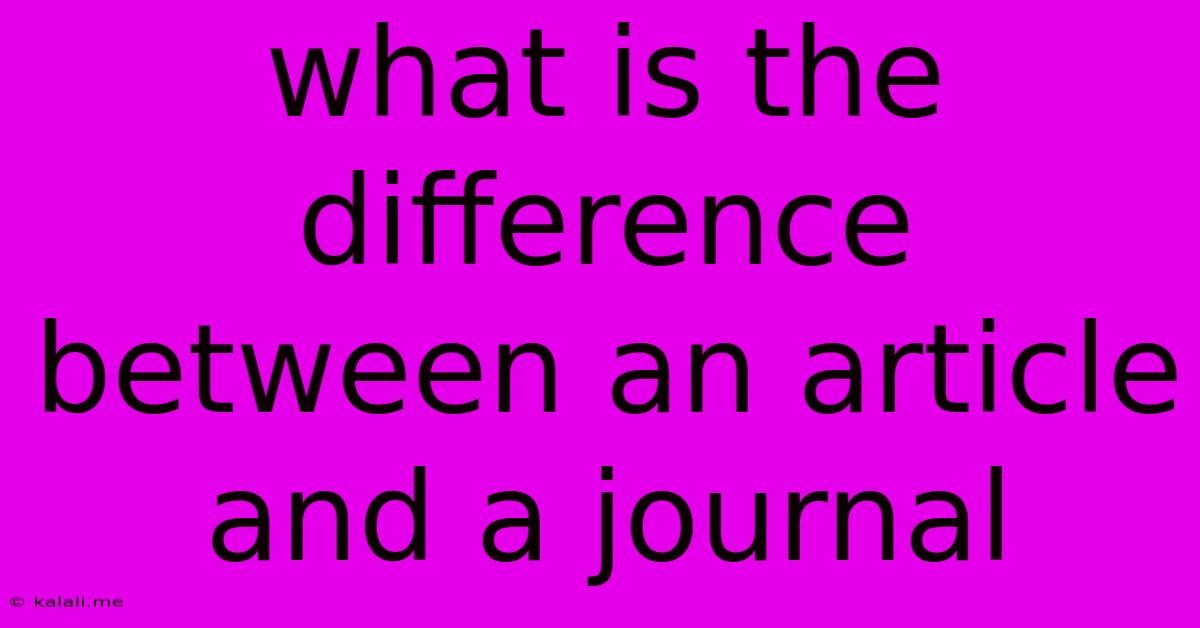What Is The Difference Between An Article And A Journal
Kalali
Jun 14, 2025 · 3 min read

Table of Contents
What's the Difference Between an Article and a Journal? Understanding Academic Publishing
This article clarifies the crucial differences between articles and journals, two frequently confused terms in the world of academic publishing and research. Understanding this distinction is vital for researchers, students, and anyone navigating the scholarly landscape. We'll explore their formats, purposes, and the role they play in disseminating knowledge.
What is a Journal?
A journal is a periodical publication, typically released several times a year, that contains a collection of scholarly articles. Think of it as a container or platform for disseminating research findings. Journals are usually dedicated to a specific academic discipline or a closely related group of disciplines, such as medicine, engineering, or history. They undergo a rigorous peer-review process, ensuring the quality and validity of the published articles. The peer-review process involves subject matter experts evaluating the research methodology, findings, and overall contribution to the field. This rigorous process is a key differentiator between a journal and other forms of publications. Journals often have an editorial board overseeing the selection and publication process.
What is an Article?
An article, in this context, refers to a single piece of scholarly writing published within a journal. It presents original research, a review of existing literature, or a critical analysis of a specific topic. Articles typically follow a structured format, including an abstract, introduction, methodology (for empirical research), results, discussion, and conclusion. The specific structure might vary slightly depending on the journal's guidelines and the type of article (e.g., research article, review article, case study). Articles are the building blocks of a journal; a journal is a collection of individual articles.
Key Differences Summarized
Here's a table summarizing the core differences:
| Feature | Journal | Article |
|---|---|---|
| Nature | Periodical publication | Single scholarly work |
| Content | Collection of articles | Original research, review, or analysis |
| Format | Multiple articles per issue | Structured format within a journal issue |
| Publication | Regular releases (e.g., quarterly) | Published within a journal |
| Peer Review | Usually undergoes rigorous peer review | Always undergoes rigorous peer review (if published in a reputable journal) |
Beyond the Basics: Types of Articles
It's important to note that not all articles are created equal. Within journals, you'll find different article types, each serving a unique purpose:
- Research Articles: Present original research findings, detailing methodology, results, and analysis.
- Review Articles: Summarize and synthesize existing research on a specific topic, providing a comprehensive overview of the literature.
- Meta-Analyses: Statistically combine the results of multiple studies to draw broader conclusions.
- Case Studies: In-depth investigations of a single case or event.
- Literature Reviews: Similar to review articles but often more focused on a specific aspect of a topic.
Understanding the nuances between articles and journals is essential for effective research and academic engagement. By recognizing the distinction, you can navigate the scholarly world with greater clarity and confidence, locating relevant information and contributing effectively to your chosen field.
Latest Posts
Latest Posts
-
What Is The Opposite Of Hollow
Jun 14, 2025
-
The Image Formed In A Plane Mirror Is
Jun 14, 2025
-
What Is The Least Common Multiple Of 14 And 12
Jun 14, 2025
-
Queens University Canada Acceptance Rate International Students
Jun 14, 2025
-
What Happens When An Electron Is Removed From An Atom
Jun 14, 2025
Related Post
Thank you for visiting our website which covers about What Is The Difference Between An Article And A Journal . We hope the information provided has been useful to you. Feel free to contact us if you have any questions or need further assistance. See you next time and don't miss to bookmark.